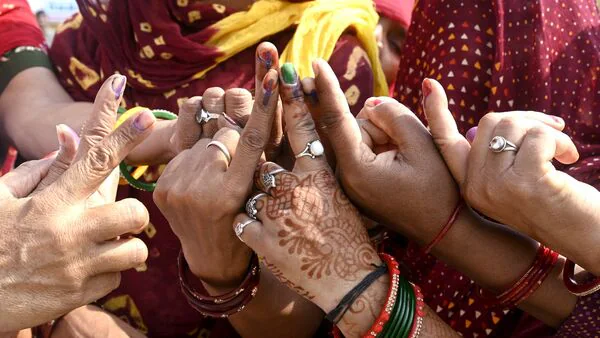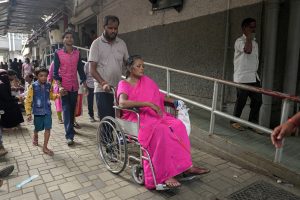How Maharashtra Poll Analyses Are Missing The Rise Of Women’s Agency
Analyses of the assembly polls in Maharashtra miss the emergent political agency of women voters by stressing only on women-centric schemes like the Ladki Bahin Yojana
- Priyanka Tupe

In the recent Maharashtra Assembly elections, the Ladki Bahin Yojana was touted as the gamechanger that returned the incumbent Mahayuti alliance to power with the critical support of women voters. The Mahavikas Aghadi supporters, on the other hand, blame women voters for their defeat.
In this pendulum of praise and blame, the idea of a new emergent political consciousness and agency of women along with multiple other factors that influenced the election results are being missed, say political analysts and strategists. What is clear is that women have been at the centre of campaigns of all major political parties in recent times with promises of increased cash transfers, free education, healthcare policies, free transport, stability in prices of essential commodities among other things.
Women constitute nearly half of Maharashtra’s electorate in 2024, with approximately 4.6 crore registered voters out of the total 9.7 crore. They have also been voting in higher numbers- going up from 59.36% in 2019 to 65.21% in 2024. Women voters increased by 11% in Thane, 9% in Palghar and 7% in Mumbai, according to the Election commission of India. In Palghar, Thane, the constituency of the outgoing chief minister, Eknath Shinde, and Mumbai suburban, they outnumbered male voters.
A Lokniti CSDS post poll survey found that 50% women preferred the Mahayuti alliance compared to 47% men. Up to 55% of women in rural and 44% in urban Maharashtra 55% expressed their preference for the winning alliance.
So, how did women influence the election outcome? We spoke to academics, analysts and political strategists to understand the confluence of factors.
‘Winning Bet’
In the summer of 2024, soon after its poor showing in the Lok Sabha elections where the Mahayuti alliance won 17 of the 48 seats losing ground to its rival Mahavikas Aghadi, the Shinde government announced the Ladki Bahin Scheme that provides a monthly financial assistance of Rs 1500 to women from low income groups with an annual income less than Rs 2.5 lakh. This was inspired by a similar cash transfer scheme, the Ladli Behna Yojana in neighbouring Madhya Pradesh, that is widely believed to have ensured the return of the incumbent Bharatiya Janata Party government to power.
In a media blitzkrieg, the Shinde government spent Rs 250 crore on advertisements — on radio, television, Marathi newspapers and hoardings and billboards at key locations such as the Mumbai-Pune expressway. Data from the Lokniti CSDS survey suggests that this paid off. Among women who have applied for the Ladki Bahin scheme, more than half (54%) women preferred the Mahayuti and even those who did not apply for the scheme, 43% women supported the winning alliance.
“This scheme is successful in reaching out to women even from Dalit and Muslim communities who voted in favour of Mahayuti in some parts of Maharashtra,” said Sushil Kumar Shinde, a political strategist based in Pune.
In surveys that he conducted across constituencies, he observed that women found that the scheme gave them agency and control over money that was theirs.
“‘However hard we work in our households or on farms, we don’t get agency over our own money. For the first time, the government has given us money over which we have control’ is the overwhelming sentiment I found while talking to women,” he said. “For the first time, women have rebelled against the men in their family and voted in Maharashtra.”
This is corroborated by another political strategist who did not wish to be named. He found women defied their family voting decisions and voted differently in Thane and Satara districts where he conducted post-poll surveys. He added that other promises such as free higher education for women from economically weaker sections introduced in this June also garnered support for the Mahayuti. This scheme which provides free professional higher education in fields such as engineering, pharmacy, agriculture and so on – earlier limited to SC, ST and OBC women – was extended to include women from lower income groups in June 2024.
Among the supporters of Mahavikas Aghadi, the Ladki Bahin scheme has led to resentment where they have accused women voters of being disloyal and swayed by cash incentives.
“Ladki Bahin scheme is projected as a gamechanger for Mahayuti’s success but it is not the only factor. Women voters don’t vote absolute decisively in any elections. Blaming women for these electoral results is unfair,” said Rajeshwari Deshpande, professor of political science at Savitribai Phule Pune University, who has been studying women voters for years.
Women-Centric Campaigns
That women voters hold significant power to sway elections is evident in how parties have made them central to their campaigns. For instance, the Shivsena (UBT) campaigns have emphasised women’s safety, promising them special police stations staffed entirely by women and the enforcement of the stringent Shakti law against sexual violence. It also promised free higher education for women. Apart from the flagship Ladki Bahin scheme, the BJP and Mahayuti had also promised to continue to provide three free gas cylinders annually for women under the existing scheme. The Congress also promised a cash income transfer of Rs 3000 under the Mahalakshmi scheme.
Both Mahayuti and MVA made numerous promises about women’s health including free cancer screening and HPV vaccines for girls between 9-15 in their manifestos. They also promised to stabilise the prices of wheat, rice, edible oil, sugar and lentils for the next five years to cope with food inflation.
The Eknath Shinde government also launched a Mahila Samman Yojana in March 2023, which provides women discounted fares on state transport buses. More than 5 crore women have benefited from this scheme. The Thane municipal corporation (TMC) also launched a discounted bus fare scheme, which provides 50% concessions on bus tickets for women on local transport.
Paternalist Attitude
What is interesting, however, is the branding and positioning of these schemes and the paternalist attitude of the political actors. These schemes, especially the flagship Ladki Bahin scheme, are branded as gifts from a benevolent brother to the state’s sisters. NCP (AP) leader Ajit Pawar redesigned his whole campaign turned into pink to attract women voters. The imagery is unmissable. Not only Pawar, but Eknath Shinde and Devendra Phadanvis of the BJP used occasions like Rakshabandhan to forge a filial relationship, campaigning with their hands flaunting multiple rakhis.
Fadnavis refashioned himself as ‘Devabhau’ (brother Devendra) and Ajit Pawar presented himself as ‘Dada’ (big brother). A source close to Pawar told Behanbox earlier that this “was an attempt at emotional appeal to women to remind them that ‘dada’ is the only promising leader who could have brought the Ladki Bahin scheme to them”. The scheme itself was portrayed as an ovalani (a gift given to sisters given on Rakshabandhan and Bhaubij) and not a welfare scheme.
Rajeshwari Deshapande believes that such schemes conceived by political parties as gifts make women seem like beneficiaries rather than proactive citizens. “It is a process of making them secondary citizens,” she said.
Not A Single Issue Election
Ladki Bahin scheme’s place in the Mahayuti victory is overstated, said experts and women on the ground. For instance, Adivasi women in Palghar questioned the scheme when high inflation levels are making it hard to run households. They would rather have the government control inflation than give them cash transfers. Maharashtra’s unemployment rate stood at 3.1% in 2022-23 and inflation rate at 6.01%, higher than the all-India rate of 5.09 %.
“We don’t want Rs. 1500. Women will vote for the parties if they promise development and not money. We need health facilities and other basic amenities in our village, and if political parties are not paying attention to these basic facilities, then what is the use of Rs.1500?” Shakuntala Bhoir, a tribal woman from Jawhar in Palghar, told BBC Marathi. They returned the sarees given to them along with the food grains distributed under the Public Distribution System to the tehsil office.
“Inflation, unemployment and rural distress has reached unimaginable levels in Maharashtra. So, women felt that the Ladki Bahin Yojana provides a cushion for survival,” said Ulka Mahajan, a social activist and the Maharashtra state convenor of the Right to Food campaign. She has also met women who are vocal about inflation and how little this scheme could do to solve the real issues.
The BJP’s approach towards welfare is not rights-based, said Ulka, who believes that the party has been systematically eroding people’s rights and substituting them with schemes. “Extreme poverty makes people lose control over their lives and choices, and it becomes challenging for them to acknowledge the difference between their rights and the temporary relief handed out to them ahead of elections,” she said.
Apart from the women centric schemes, other factors like caste consolidations, strong booth management, selection of candidates, religious polarisation, delivery of schemes, funds to various boards and trusts (caste groups) right before the announcement of the elections worked in favour of the BJP and Mahayuti, said experts.
“The Mahayuti has successfully consolidated micro OBCs in the state. Multiple sub-castes among the OBCs who had no political representation felt polarised because of the Maratha reservation agitation. They feared that their reservation would be hampered if the MVA coalition that supported Maratha reservation came to power because garajwant (needy) Marathas/Kunabis too are demanding their share of the OBC quota. This is how OBCs consolidated strongly and voted for the Mahayuti alliance,” explained Sushil Kumar Shinde.
Vidarbha and Marathwada regions that voted in favour of the MVA alliance in the Lok Sabha elections and where the demand for fair price for cotton and soybean are important issues, overwhelmingly voted for the Mahayuti alliance in the assembly elections because of the OBC consolidation and divide in Maratha votes, said political strategists.
But there is no denying that people’s anger at the party splits spearheaded earlier by Eknath Shinde and Ajit Pawar was calmed to some extent by multiple welfare schemes and measures – not just Ladki Bahin, but also the power bill waiver for farmers and the Namo Shetkari Yojana, an income support scheme for farmers, which added an additional Rs 6000 to the central scheme’s provision, also of Rs 6000.
We believe everyone deserves equal access to accurate news. Support from our readers enables us to keep our journalism open and free for everyone, all over the world.




